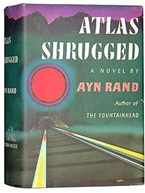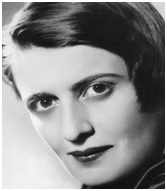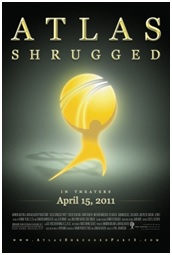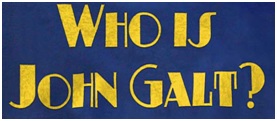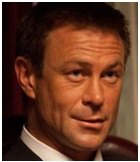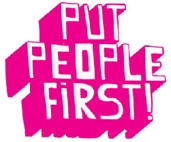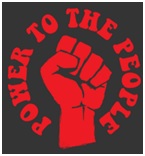|
 |
|
 |
Atlas Shrugged - Corporate Social Responsibility
Atlas Shrugged (1957) Written by the Russian-born American female author, Ayn Rand (1905-1982)
Fun facts
Dagny Taggart, railroad executive. Hank Rearden, her lover and steel boss. Francisco d’Anconia, her ex-lover and businessman. Jim Taggart, her brother and boss. Ellis Wyatt, oil boss. John Galt, business leader .
The story Dagny Taggart, an executive in Taggart Transcontinental (an American railroad company) and its boss, her brother Jim, are struggling to keep it alive in the face of increasing government interference and a worsening economy. Dagny is working on the repair of its railway line to Colorado. She wants to use the world-beating new Rearden metal (developed by the self-made steel boss, Hank Rearden) whom she meets But the government criticizes the metal, leading to a crash in Taggart’s share price. Dagny sets up her own successful company to re-build the Colorado line, having discovered that her ex-lover, Francisco d’Anconia has become a worthless playboy. Disillusioned with America’s anti-business culture, Francisco is deliberately destroying his once hugely profitable copper business. But he respects Hank for defending his steel business. Dagny, Hank and the young founder of Wyatt Oil, Ellis Wyatt, all fight against higher taxes and
punitive government regulation and control of business. As the American economy worsens, people constantly ask “Who is John Galt?”, a mysterious man who has disappeared. Leading innovators and business people begin to suddenly disappear. They include Ellis Wyatt and the inventor of a revolutionary static electric motor. Dagny and Hank think America is doomed, because it hates creativity and business success. Hank is arrested but released, because the government (led by Wesley Mouch) wants his co-operation for a new law requiring patents (including his own for Rearden metal) to be given away to the government. Hank reluctantly supports this after being blackmailed over his affair with Dagny by her brother, Jim, who hopes this will help him get government support for his ailing railroad business. Dagny’s plane crashes in a valley where she finds the business people and inventors who have disappeared. She discovers that they are on strike (the “strike of the mind”), organized and led by
John Galt, the inventor of the static electric motor. She falls in love with
him but returns to the railroad to work. Her affair with Hank (Grant Bowler in the 2011 film, pictured right) is used by his vindictive wife, Lillian, to blackmail Dagny to support the government’s anti-business laws including the (just announced) nationalization of the railroad industry. Instead Dagny publicly announces the affair and the blackmailing, warning America of its dictatorial government. The government organizes a riot at Hank’s steel business, but it is defeated by the steelworkers, led by Francisco d’Anconia, who has been using his playboy lifestyle as cover for supporting John Galt and his strike of the mind. Francisco saves Hank’s life in the riot and persuades him to join the strike. John Galt is taken prisoner and tortured by the government after publicly announcing the pro-business demands of the strike. But he is rescued by the strikers and Dagny who finally joins the strike herself. Galt makes a radio address explaining his philosophy based on self-interest. Socialist policies (based on state intervention) ruin the American economy and the strikers prepare to return to put things right.
Lessons for corporate social responsibility
1. People and customers matter A country like America is made great by its people's:
Creative minds must be used to provide practical solutions to customers’ problems (like Rearden steel and the static electric motor). The question, Who is John Galt?’ refers to his
2. Be wary of government The book's heroes like Dagny and Galt put the individual first, not government. Galt says that:
3. Enlightened self-interest Social progress isn't achieved by self-sacrifice (voluntary or imposed by government) but by enlightened self-interest. In other words, people must only do good because it’s in their interests to do so. So everybody in the strike of the mind swears an oath that ends: “I will never live for the sake of another man, nor ask another man to live for mine”. Ayn Rand later called this philosophy “objectivism”. 4. Money matters “Money is the root of all good”, says Francisco, because it is essential to production and personal achievement. But it can only make you happy he adds, if you have the right values to know what to do with it.
5. Promote not punish success Dagny (Taylor Schilling in the 2011 film, pictured right) and Hank fight against:
Francisco d’Anconia believes money is a fair reward for producing things, although an honest man “can’t consume more than he has produced”. In his radio address, John Galt attacks: “unearned rewards and unrewarded duties”. He says that people must fight for their creativity and happiness (which is based on rational creative thought, not “emotional whims”).
6. People possess principles People are naturally good. Evil can only exist, if it is allowed to happen.
Key quotes on ethics “I saw that evil was impotent ... and that the only weapon of its triumph was the willingness of the good to serve it”, John Galt. “In any compromise between good and evil, it is only evil that can profit”, John Galt “Morality ends where the gun begins”, John Galt
Key quotes on success We are on strike against self-immolation [self-sacrifice]. We are on strike against the creed of unearned rewards and unrewarded duties. We are on strike against the dogma that the pursuit of one's happiness is evil, John Galt Do not let the hero in your soul perish in lonely frustration for the life you deserved and have never been able to reach... The world you desired can be won, John Galt I refuse to apologize for my success, Hank Rearden
Key quotes on money and happiness Happiness...proceeds from the achievement of one’s values, John Galt. Run for your life from any man who tells you that money is evil, Francisco d’Anconia. Money will not purchase happiness for the man who has no concept of what he wants, Francisco d’Anconia But money is only a tool, Francisco d’Anconia
Key quote on economics Money is made possible only by the men who produce, Francisco d’Anconia.
Key quote on business success Wealth is the product of man’s capacity to think, Francisco d’Anconia
Key quote on learning and creativity Man’s mind is his basic tool of survival, John Galt I am, therefore I’ll think, John Galt If devotion to truth is the hallmark of morality,
then there is no greater, nobler, more heroic form of devotion than the act of a man who assumes the responsibility
of thinking, John Galt.
Other key quotes “Who is John Galt?”
Two literature websites to recommend 1. sparknotes.com 2. litcharts.com |
|
|
||
|
|
|
||
|
||
| Copyright © wisdomtowin.com All Rights Reserved | ||
|

